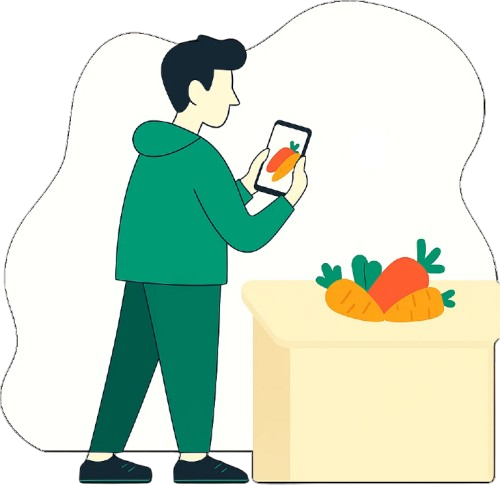Meet Lil' Broc
Lil' Broc's journey began when he made the move from the little garden plot where he grew up to the big city veggie patch. Like so many newcomers, he fell in love with the wonderful salad mix he found on the busy streets: the strange enticing aromas of Lychee Town where cabbages hung out in Kimchi Park, where he could watch bitter melons and lotus roots discuss business over lunch; the bustle at the intersection of Gazpacho and Vine where tomatoes blushed at the whistles of long cool cucumbers; Little Havana's plantain stalls, the bright red strawberries that wandered the beach, even the onions that hung out by the stadium and sometimes hawked souvenirs.
The Problem
But like every young urban vegetable, when the bills came due he saw he had a problem. The city was expensive. So Lil' Broc set out to cut costs by cooking for himself. He was no chef, but he was a fast learner so he began testing new ingredients, new recipes. One night he came home to his small apartment and opened the fridge. There in the crisper drawer was a sight that had become all too common: caved-in grapes caved rimed by mold, a bit of wilted cilantro, carrots that had gone slick and slimey. All that waste. Food, money, the environment. What could he do?

The Solution
Lying in bed one night, he thought there had to be a better way, and there on his bedside table, he saw the answer, his phone. What if a fridge was more than just an appliance? What if he could bring the world of knowledge together with the produce he wanted to save? The next day he got to work creating what he liked to call his magic fridge. Linked to his phone, the fridge could find all the best and most recent information on produce freshness, storage methods, nutrition, and more. Best of all, it could speak back to his phone, let it know when things were about to go bad and give him advice on keeping things fresh. And it worked! Lil' Broc no longer wasted his produce. He had more money in his wallet and enjoyed trying new things with produce. In fact, he was so happy that he wanted to share his magic fridge with everyone else so that they, too, could have a fresh start.
Powered by Advanced AI
The most accurate produce recognition and freshness tracking available

Real-time Analysis
Our AI continuously learns and improves, providing the most accurate freshness assessments based on visual cues, color analysis, and texture recognition.

Smart Recommendations
Get personalized storage tips, recipe suggestions, and optimal usage timing based on your specific produce and preferences.

Continuous Learning
Our AI system gets smarter with every photo, ensuring increasingly accurate recognition and better recommendations over time.
Snap to Add
Take a photo of your produce and let AI do the rest
Simply point your camera at one or multiple produce items. Our advanced AI instantly recognizes what you have, tracks freshness levels, and adds everything to your virtual fridge automatically. No more manual entry - just snap and save!

Keep from wasting your produce. Save your hard-earned money
– Lil' Broc
and enjoy trying new things with fresh produce.
What Our Users Say
"Lil' Broc has saved me so much money! I used to throw away so much produce, but now I know exactly when things will go bad."
"The storage tips are amazing! My vegetables last twice as long now. This app is a game-changer for meal planning."
"Finally, an app that actually helps reduce food waste. The notifications are perfect timing and the interface is so easy to use."

Easily organize, track and manage the foods in your kitchen to start living a healthy lifestyle that focuses on reducing food waste. Learn the shelf life of various foods, fruits, and veggies and how to properly store various foods in your fridge with help from Lil' Broc!
Keep from wasting your produce. Save your hard-earned money and enjoy trying new things with fresh produce.
Download the lil' broc app for free today!
